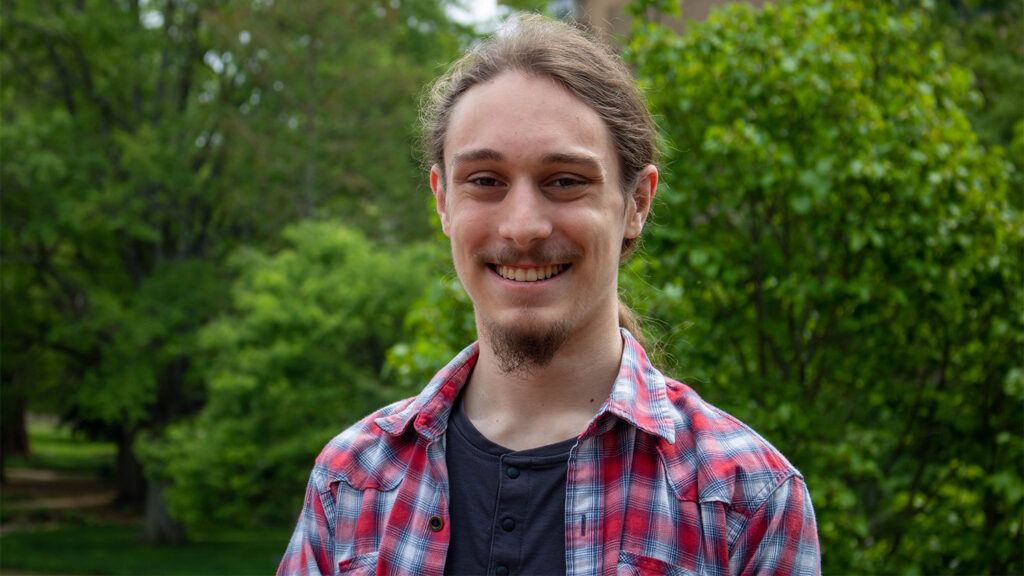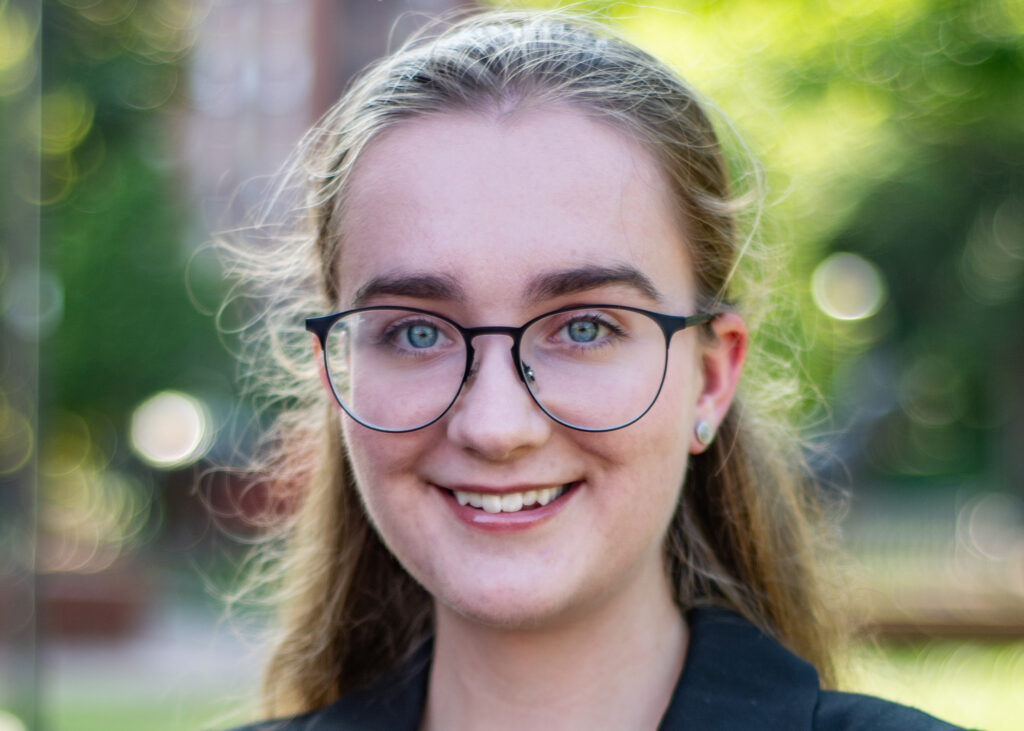Katie Traynelis, Etienne Phillips Earn Goldwater Scholarships
The University Fellowships Office is pleased to announce that Katie Traynelis (Chemical Engineering ’24) and Etienne Phillips (Mathematics ’24) have received the Barry M. Goldwater Scholarship.
The Goldwater Scholarship Program, named for former U.S. Senator Barry M. Goldwater, is one of the oldest and most prestigious scholarships in the fields of natural sciences, engineering and mathematics. Recipients are college sophomores and juniors who demonstrate the following:
- Strong commitment to a research career in the natural sciences, mathematics and engineering
- Academic excellence in these fields
- Strong potential for significant future contributions to research in their chosen field.
Recipients must be nominated by their academic institution in order to be considered for the Goldwater Scholarship. This year, more than 1,200 students were nominated for consideration, with 413 ultimately selected for the award. The scholarship provides up to $7,500 a year to help recipients cover costs associated with tuition, mandatory fees, books, room and board.
This year’s recipient selection brings the total number of Goldwater Scholars at NC State to 66.
Meet this year’s awardees:
Etienne Phillips

How do you plan to use the scholarship funds?
The scholarship funds will go straight to covering basic necessities during the school year. I’ve never had any financial assistance from family or friends to cover the costs of attending college, so everything from tuition to housing and food have been covered by a combination of scholarships and part-time jobs. The Goldwater will help me reach enough funding for the year that I won’t need to work a part time job just to make ends meet while studying in my senior year, so I can focus on the important things: studying, doing research and running the Society for Undergraduate Mathematics Club at NC State (SUM Club), among many other things.
Most of all, the Goldwater means peace of mind — the constant stress of not knowing if or how I’ll be able to pay bills cannot be understated for me.
What motivated you to apply for the Goldwater Scholarship and what does it mean to you to receive it?
I was encouraged to apply by Dr. Alina Duca, director of undergraduate programs in mathematics (to whom I owe a great deal), who saw my potential as an applicant. I come from a background that never placed much emphasis on academic success. I was a B-average student in high school, and I never put much thought into academics. After high school, I spent some time in college before dropping out, but eventually came to NC State after I discovered a passion for mathematics.
Since coming to NC State, I’ve put my all into capitalizing on the academic opportunities offered to me here. Winning the Goldwater means affirmation of my abilities and a signifier of how far I’ve come and all the struggles I’ve overcome to get here. It’s national recognition that represents a ton of work I’ve put into attaining success and becoming the best mathematician I can be.
Moreover, the Goldwater signifies that I’m a competitive applicant for graduate school, which has always been my true goal in studying mathematics: to participate in the creative research process to invent and discover new mathematics.
What is your field of study/degree and what do you hope to do after graduation?
As mentioned above, I’m planning to go to graduate school in pure mathematics, which I’ll be applying for starting this fall. It’s been my dream to be a mathematician since I discovered my love of mathematics a few years ago, and graduate school will be the next step in my journey to becoming one. I am particularly interested in studying things in the algebraic direction, particularly topology/algebraic topology, but also combinatorics.
Do you have any advice for students who are thinking of applying to programs like the Goldwater Scholarship?
Above all, I would recommend not worrying about winning awards like the Goldwater too much. It’s far more important to do what feels right to you, and pursue what interests you the most.
I’ve been asked for advice on similar things from freshmen or high school seniors, and I can’t help but feel like they’re worried about the wrong things. I hear stories about grad students in their second or third years — sometimes at top universities — who realize they don’t really enjoy what they’re doing, but they pushed themselves to be good at it anyway, and now they’re having an existential crisis.
Maybe I’m the last person who should be saying this, but life isn’t about winning awards, making good grades or achieving traditional markers of success. I won the Goldwater not because I set out to win a competitive scholarship, but because I pursued something that I love doing — i.e., mathematics. If you’re doing something you truly love to do, you won’t be able to help but to be good at it because you’ll really put your all into it. If you haven’t found something that you love like that, then finding that should be your priority.
From there, the papers you’ve helped write will, the recommendation letters that speak to your enthusiasm and abilities, the essays that talk about your personal journey, etc., will all come naturally. Don’t worry too much about these things because they should be genuine.
Katie Traynelis

How do you plan to use the scholarship funds?
The scholarship funds will go towards my tuition for my senior year.
What motivated you to apply for the Goldwater Scholarship and what does it mean to you to receive it?
My main motivation in applying for this scholarship was my passion for research. I first heard about the Goldwater Scholarship from Dr. [Albert] Keung, one of my research mentors. He encouraged me to apply, and after learning more about the scholarship and seeing the essay prompts, I became very excited about applying. The essay questions asked me to consider not only my research project, but also why I want to pursue a career in research. As I formulated my responses, I felt motivated by both the work I had completed and by the future. I think science is so inspiring, and I really enjoy the work that I am doing. My goal was to share my passion with the reviewers, and I enjoyed the opportunity to discuss my research and the impact that it has had on me.
I was honored and humbled to be selected as a Goldwater Scholar. I feel that my selection as a scholar is a reflection of the hard work and passion my mentors have poured into me. I have been blessed with many opportunities and wonderful mentors throughout my time at NC State. Dr. Keung and Dr. [Balaji] Rao, my research professors, not only allowed me to work with a graduate student on an independent project, but also provided mentorship and advice, which contributed greatly to my growth as a researcher. Alison Waldman, my graduate mentor, guides me in the lab while also pushing me out of my comfort zone. Even when I was learning the ropes, she was patient and encouraging. There have been other professors, graduate students, friends and family that have encouraged me and helped me grow into the person I am today. This award is a reflection of their support and guidance.
What is your field of study/degree and what do you hope to do after graduation?
I am currently a senior in chemical engineering. Within my major, I am pursuing the biomolecular concentration as well as minors in biomanufacturing and biotechnology. My courses blend engineering and science classes so that I am grounded in both the fundamental science behind my work as well as the problem solving aspect of engineering. After graduation, I plan to pursue a Ph.D. in chemical engineering, and my hope is to continue working at the intersection of biology, chemistry and engineering. In graduate school, I would like to work on a project with applications to human health. My long-term professional goal is to become a professor at an R1 research university, and I plan to remain involved in research throughout my career, ideally through advising and directing a research group.
Do you have any advice for students who are thinking of applying to programs like the Goldwater Scholarship?
First, I would advise anyone interested in research to get involved as soon as possible. Even if you decide that it isn’t for you, research teaches you a lot. Specifically, for those interested in applying to programs like the Goldwater Scholarship, I have several pieces of advice:
- Reach out to your mentors, professors and people you know who have received the award. Your materials will need to go through several rounds of revisions before you are ready to submit them, and the more eyes you have looking over what you have written, the better.
- Really think about where you want to be five years from now, 10 years from now, and even 20 years from now. What do you see yourself doing? What impact do you want to have made, not only on the scientific community but also on those around you? These questions will help you motivate your answers to the essay prompts.
- Start early! It’s a lot of writing. When I first looked at all the prompts, I felt a little overwhelmed, but also excited. The questions allow you to explore what you have learned from your research experience, where you want to be in the future and the impact you would like to have. Starting early will allow you to revise and refine your answers, and it will also give you time to have others review your writing.
- Enjoy the process! I learned a lot about myself and what I wanted from my future throughout the application process. It can seem overwhelming, but at the end of the day you will be writing about things you are passionate about.
If you are interested in applying for a prestigious scholarship or fellowship opportunity such as the Goldwater Scholarship, the University Fellowships Office can help. The office helps students identify awards, draft and refine essays and application materials, and acts as a liaison to funding agencies. Fellowship advisors meet with students individually in order to provide unique and appropriate advice. Learn more on the website.
This post was originally published in DASA.